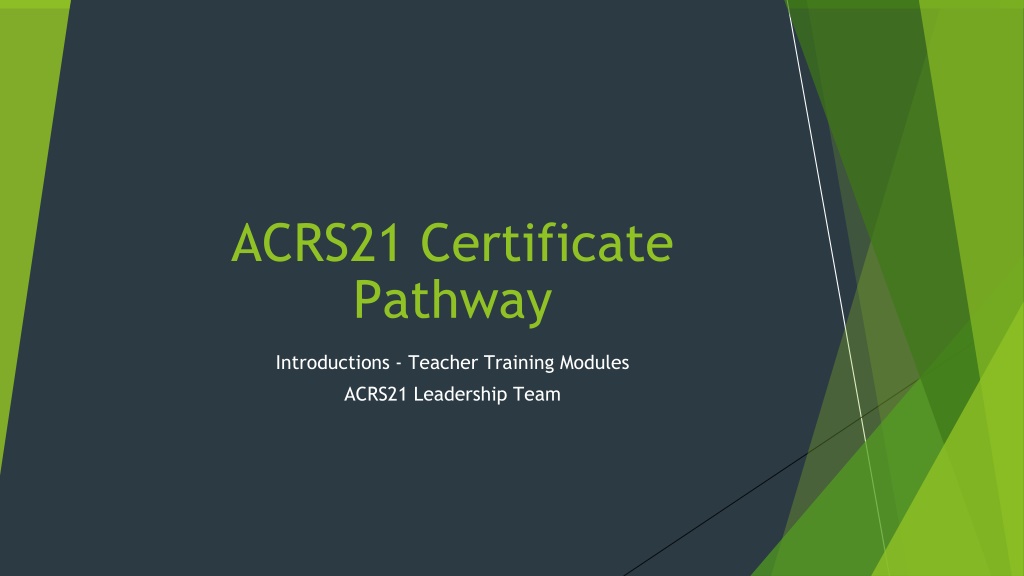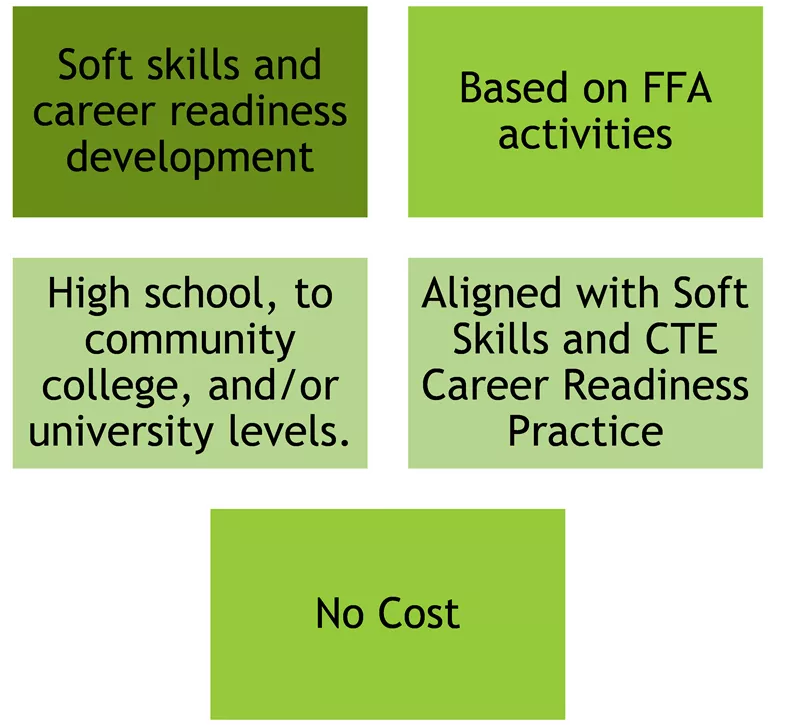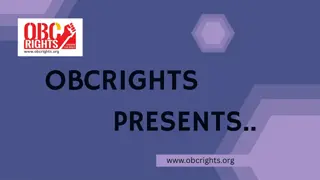ACRS21 Certificate Pathway Overview
ACRS21 Certificate Pathway offers a transferable certificate pathway from high school to university levels, focusing on soft skills and career readiness development. The program includes requirements such as leadership activities, community service, public speaking, SAE projects, and more, totaling 250 hours over 4 years. Industry-backed by employer responses, this pathway aims to equip students with essential skills for the Agriculture Industry. Best practices outline the main steps for students to complete the certification process successfully.
Download Presentation

Please find below an Image/Link to download the presentation.
The content on the website is provided AS IS for your information and personal use only. It may not be sold, licensed, or shared on other websites without obtaining consent from the author.If you encounter any issues during the download, it is possible that the publisher has removed the file from their server.
You are allowed to download the files provided on this website for personal or commercial use, subject to the condition that they are used lawfully. All files are the property of their respective owners.
The content on the website is provided AS IS for your information and personal use only. It may not be sold, licensed, or shared on other websites without obtaining consent from the author.
E N D
Presentation Transcript
ACRS21 Certificate Pathway Introductions - Teacher Training Modules ACRS21 Leadership Team
ACRS21 Certificate Pathway Overview Soft skills and career readiness development Based on FFA activities Goal: To establish a transferable certificate pathway High school, to community college, and/or university levels. Aligned with Soft Skills and CTE Career Readiness Practice No Cost
ACRS21 Certificate Pathway Overview Application Manager - State FFA Degree and Proficiency Award Applications ACRS21 is Managed in AET Teacher Training Modules and Resources
ACRS21 Certificate Pathway Overview Industry Backed Certificate Ag Industry Survey 117 employer responses JG Boswell Wonderful Gallo 85% of responders said they would honor the ACRS21 Certificate Top skills need in the Ag Industry
ACRS21 High School Certificate Requirements Meetings and Committees 15 hours Leadership activities/positions 40 hours Team Participation 25 hours Community Service 30 hours Public Speaking (minimum of three events) 1 hour 100 hours SAE projects Job Shadowing and Career Exploration 27 hours Agriscience Research Activities 10 hours Career Counseling 2 hours Total Hours for the High School Certificate = 250 hours over 4 years
Best Practices - 6 Main Steps ACRS21 Teaching Training Modules and Resources High School Certificate Checklist Students Getting Started Guide - graphic organizer Assist students in completing requirements Open ACRS21 Application - AET Application Manager Foundational SAE Project - career exploration activities Resume - career goals Soft Skills Survey Annual review of student progress Conduct 3 evaluations in AET Monitor student completion of certificate Final Steps for Certification Student Interview with Advisor Assist students in finalizing certificate requirement checklist Verification signatures Submission List
Student Getting Started Guide ACRS21: Getting Started Student Name: _________________________ Step 1: Log In to The AET Go to http://www.theaet.com, and login by choosing: Step 2: Complete Pre-Test Select PROFILE. Select Test your knowledge and gain a passing score.
Teacher Training Modules and Resources 10 Teacher Training Modules and Resources 30 Minute Videos Module Highlight - designed to provide additional ideas for engaging students Chapter Highlight - specific examples of how to incorporate the activity into your chapter
Presenter -Jonathan Moules Module Highlights Module 2: Meetings and Committees Types of meetings and committees Review of helpful resources Integrating social activities Chapter Spotlight - Oneals-Minarets Chapter FFA Interviews with the Chapter President and FFA Advisor Functions of meetings How to engage members Prepare FFA Officers for leadership roles
Presenter - Jasmine Flores Module 3: Leadership Activities and Positions Module Highlights Modeling vs. Learning Leadership How students can identify their leadership strengths Leadership Conferences Engaging Officer Teams in leadership roles Chapter Spotlight - Bakersfield - North FFA Chapter Value of leadership opportunities for students
Presenter - Cameron Standridge Module Highlights Ideal Team Player Identify possible dysfunctions of a team Review of CDE Competitions, Team Practice, and Project Teams Connection between Team Participation and Career Success Module 4: Team Participation Chapter Spotlight - Tulare FFA Chapter Interview with FFA Advisor How do you build team dynamics? Advice for other s coaching CDEs Interview with Student What do you enjoy about CDEs What have you learned How does it apply to your Career Goals
Presenter - Cameron Standridge Module Highlights Explanation of the 4 Steps of Community Service How to identify opportunities Development of a Project Plan How to Engage Community Partners Living to Serve Grants - tutorial on how to access grant information on ffa.org Module 5: Community Service Chapter Spotlight - Firebaugh FFA Chapter Interview with FFA Advisor Community service activities Benefits for students and community members Advice for other advisors
Presenter - Cameron Standridge Module Highlights Module 6: Public Speaking Benefits of Public Speaking Overcoming Nervousness Speaking Contests, Class Presentations, and Formal Presentations Chapter Spotlight - Sierra FFA Chapter Value of skills learned when students speak, tips for public speaking
Presenter - Jonathan Moules Module Highlights Module 7: SAE Projects and Work Experience SAEs of Today SAE Roadmap Effectively Engaging Students Big Idea - steps to getting students College and Career Ready Chapter Spotlight - Clovis East FFA Chapter Interview with FFA Advisor Types of school based enterprises Benefits to students Facilities tour of school farm
Presenter - Jasmine Flores Module 8: Job Shadowing and Internships Module Highlights Job Shadowing and Internships Explained Other examples of Career Development Activities Industry tours Career Fairs and College Fairs Chapter Spotlight - Atwater FFA Chapter Value of a job shadowing Job Shadow Day Steps necessary for placement at job sites How to contact potential employers Necessary Forms
Presenter - Jonathan Moules Module Highlights Scientific Method and the Connections to Success Intellectual Flexibility Technical Skills Research Strategies that lead to Critical Thinking/Problem Solving Skills Areas of Agriscience Research in Agriculture Module 9: Agriscience Chapter Spotlight - Exeter FFA Interview with FFA Advisor Opportunities for student engagement Benefits of Agriscience projects Interview with Dr. Lynn Martingale, Professor in Agricultural Education at UC Davis Agriscience projects prepare students for careers Types of skills learned Advice for teachers supervising agriscience projects
Presenter - Jasmine Flores Module Highlights Module 10: Career Counseling Education plan/Career goals 5-year plan Financial aid advising Ideas that involve cultivating relationships with counselors Chapter Spotlight - Madera South FFA Value of creating career goals with an adult Interview with Career Counselor Educational Plan and a Career Plan Career Development Events Value of Soft Skills to Employers

 undefined
undefined



























